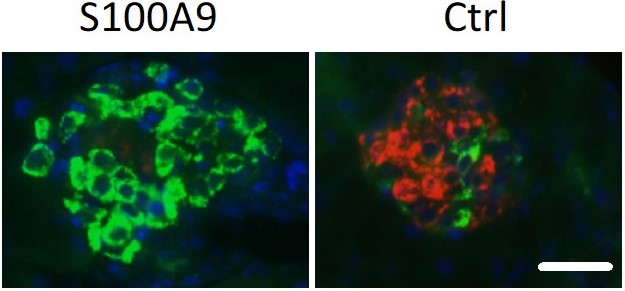Coppari group highlighted a protein extending lifespan in diabetes
After decades of research on diabetes, insulin deficiency remains a great medical and societal challenge. Leptin monotherapy corrects insulin deficiency, but cannot easily become a therapeutic avenue because of the central localization of its action.
The role of S100A9 in insulin deficiency
In their study published in Nature Communications, scientists of Prof. Roberto Coppari group have highlighted a protein under the control of leptin, S100A9, which has an anti-diabetic action without restoring insulin production. This study indicates that S100A9 exerts several protective actions against metabolic imbalance and lethality caused by insulin deficiency. It normalizes hepatic fatty acid oxidation and hyperketonemia and promotes survival.

Overexpression of S100A9 (left image) has anti-diabetic action without restoring insulin production (in red) (Figure 3 of Ramadori et al. 2019 Nature Communications).
The protein S100A9 is a putative target in insulin deficiency
S100A9 was identified as a peripheral mediator of leptin action, which may be an easier target than leptin itself. This study suggests that S100A9 may allow to circumvent the development of leptin resistance in the treatment of diseases caused by β-cell loss.
Posted by: Véronique Rosset
27 Sept 2019